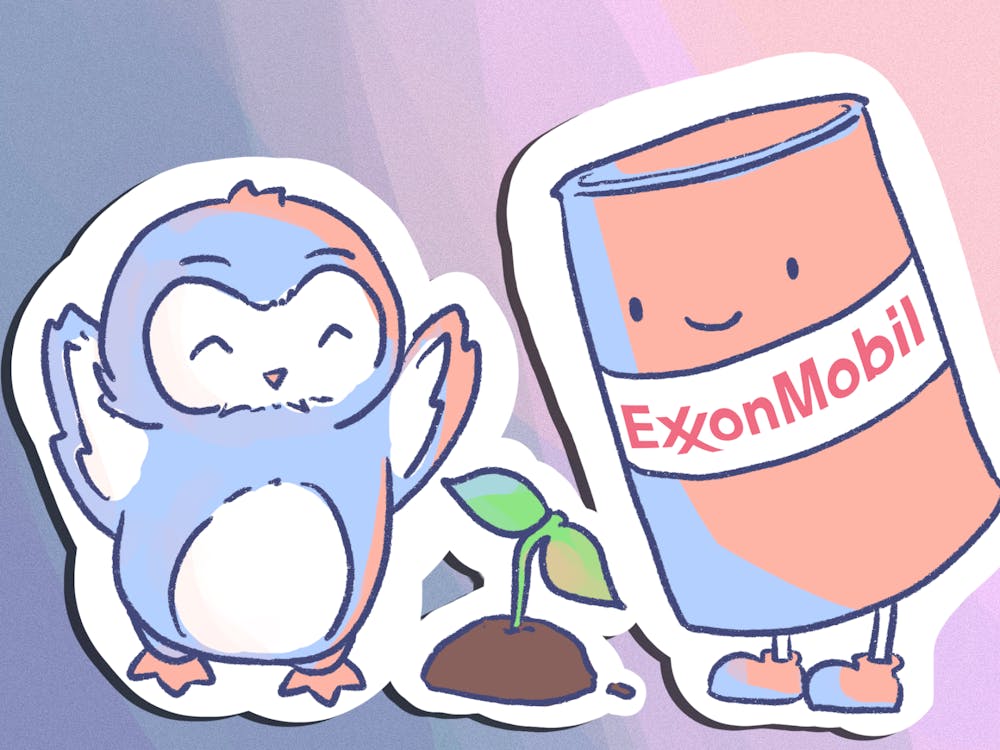Research partnership announced with Exxon Mobil

Rice and Exxon Mobil entered into a research agreement that aims to develop sustainable energy projects related to oil and gas operations, according to an April 14 press release.
“The agreement is expected to significantly advance Rice’s leadership in sustainability and its role in driving impactful advances in the energy sector,” the press release read.
Ramamoorthy Ramesh, the executive vice president for research, said this agreement allows the university to present research ideas to the company that may become collaborative projects with Rice faculty. The current agreement supports three projects, with the potential to expand.
The first project, led by Qilin Li, civil and environmental engineering professor, aims to treat dangerous wastewater produced by fracking operations.
Fracking is a technique that pumps water and sand into rock formations to extract trapped oil, producing up to 12 barrels of water for every barrel of oil. Wastewater by fracking contains excess salt and dangerous elements, according to the University of Michigan.
Exxon Mobil said that by 2027, they project to extract one million barrels of oil a day from their fields in the Permian Basin, an area that stretches through much of western Texas and southeastern New Mexico, nearly doubling their current production figures.
The Permian Basin is only one of the four major locations where Exxon Mobil has oil extraction operations that produce wastewater.
Li said the treatment of wastewater from oil and gas companies has been an interest of hers since she first came to Rice and the rise in oil extraction using fracking almost two decades ago.
“I’ve always wanted to figure out economical ways to reuse that water,” Li said. “Back then, there were a lot of protests by the farmers because the hydraulic fracturing activity takes a lot of fresh water in order to produce oil and gas. At the same time, the farmers were experiencing droughts and their animals were dying.”
Li said that extraction of oil using techniques like hydraulic fracturing became popular in the early 2000s. However, the process requires water from the surrounding area and generates large amounts of wastewater.
“There is so much produced water, and if you don’t treat it, it poses a very big problem,” Li said. “Right now, the industry injects it underground … but you have limited storage capacity underground, and too much injection would also lead to potentially seismic activity.”
Li said the goal of her research is to use environmentally friendly technology to remove dangerous organic compounds and ammonium that are present in wastewater.
“We’re looking at [two] approaches,” Li said. “One is destruction of ammonium and other volatile organic compounds such as benzene [and] toluene. Alternatively, try to recover the ammonium from that wastewater and turn it into a resource.”
Ramesh said that the goal of Rice’s collaboration on the agreement was to give opportunities to students.
“Our main products are students,” Ramesh said. “This is entirely about funding students, postdocs, undergraduates … many of them publish papers, and they, of course, go to graduate school and stuff like that.”
More from The Rice Thresher

O’Rourke rallies students in Academic Quad
Former U.S. Rep. Beto O’Rourke of El Paso, Texas spoke in front of the Sallyport to a sea of sunglasses and “end gun violence” signs April 17. The rally, organized by Rice Young Democrats, took place in the academic quad from noon to 2 p.m.

Uncertainty, fear and isolation looms over international students after visa revocations
With the wave of international student visa revocations across the country, including three students at Rice and two recent graduates, international students have expressed fears that their visas will soon be terminated without warning.

All bike no beer: bikers race remaining heats without spectators
Modified Beer Bike races, dubbed “Bike Bike,” were held at the track April 18 from 5-8 p.m. Results were released by email April 21.

Please note All comments are eligible for publication by The Rice Thresher.